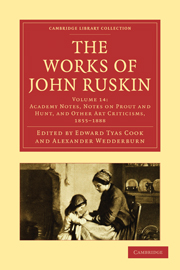Book contents
- Frontmatter
- Contents
- LIST OF ILLUSTRATIONS
- INTRODUCTION TO THIS VOLUME
- PART I “ACADEMY NOTES” (1855–1859, 1875)
- LIST OF ARTISTS AND WORKS MENTIONED IN “ACADEMY NOTES”
- PART II LETTERS AND PAPERS ON PICTURES AND ARTISTS (1858–1887)
- 1 PRE-RAPHAELITISM IN LIVERPOOL (1858)
- 2 GENERALIZATION AND THE SCOTCH PRE-RAPHAELITES (1858)
- 3 JOHN LEECH'S OUTLINES (1872)
- 4 ERNEST GEORGE'S ETCHINGS (1873)
- 5 THE FREDERICK WALKER EXHIBITION (1876)
- 6 ARTHUR BURGESS (1887)
- 7 THE BLACK ARTS. A REVERIE IN THE STRAND (1887)
- PART III NOTES ON SAMUEL PROUT AND WILLIAM HUNT (1879–1880)
- APPENDIX
- Plate section
4 - ERNEST GEORGE'S ETCHINGS (1873)
Published online by Cambridge University Press: 05 February 2015
- Frontmatter
- Contents
- LIST OF ILLUSTRATIONS
- INTRODUCTION TO THIS VOLUME
- PART I “ACADEMY NOTES” (1855–1859, 1875)
- LIST OF ARTISTS AND WORKS MENTIONED IN “ACADEMY NOTES”
- PART II LETTERS AND PAPERS ON PICTURES AND ARTISTS (1858–1887)
- 1 PRE-RAPHAELITISM IN LIVERPOOL (1858)
- 2 GENERALIZATION AND THE SCOTCH PRE-RAPHAELITES (1858)
- 3 JOHN LEECH'S OUTLINES (1872)
- 4 ERNEST GEORGE'S ETCHINGS (1873)
- 5 THE FREDERICK WALKER EXHIBITION (1876)
- 6 ARTHUR BURGESS (1887)
- 7 THE BLACK ARTS. A REVERIE IN THE STRAND (1887)
- PART III NOTES ON SAMUEL PROUT AND WILLIAM HUNT (1879–1880)
- APPENDIX
- Plate section
Summary
My dear Sir,—I am entirely glad you had permission to publish some of Mr. Ernest George's etchings; they are the most precious pieces of work I have seen for many a day, though they are still, like nearly everything the English do best in art, faultful in matters which might have been easily conquered, and not a little wasteful, sometimes of means and time; I should be glad, therefore, of space enough in your columns to state, with reference to these sketches, some of the principles of etching which I had not time to define in the lectures on engraving I gave this year, at Oxford, and which are too often forgotten even by our best draughtsmen.
I call Mr. George's work precious, chiefly because it indicates an intense perception of points of character in architecture, and a sincere enjoyment of them for their own sake. His drawings are not accumulative of material for future use; still less are they vain exhibitions of his own skill. He draws the scene in all its true relations, because it delights him, and he perceives what is permanently and altogether characteristic in it. As opposed to such frank and joyful work, most modern architectural drawings are mere diagram or exercise.
I call them precious, in the second place, because they show very great powers of true composition. All their subjects are made delightful more by skill of arrangement than by any dexterities of execution; and this faculty is very rare amongst landscape painters and architects, because nearly every man who has any glimmering of it naturally takes to figure painting—not that the ambition to paint figures is any sign of the faculty, but that, when people have the faculty, they nearly always have also the ambition.
- Type
- Chapter
- Information
- The Works of John Ruskin , pp. 335 - 338Publisher: Cambridge University PressPrint publication year: 2010First published in: 1904



